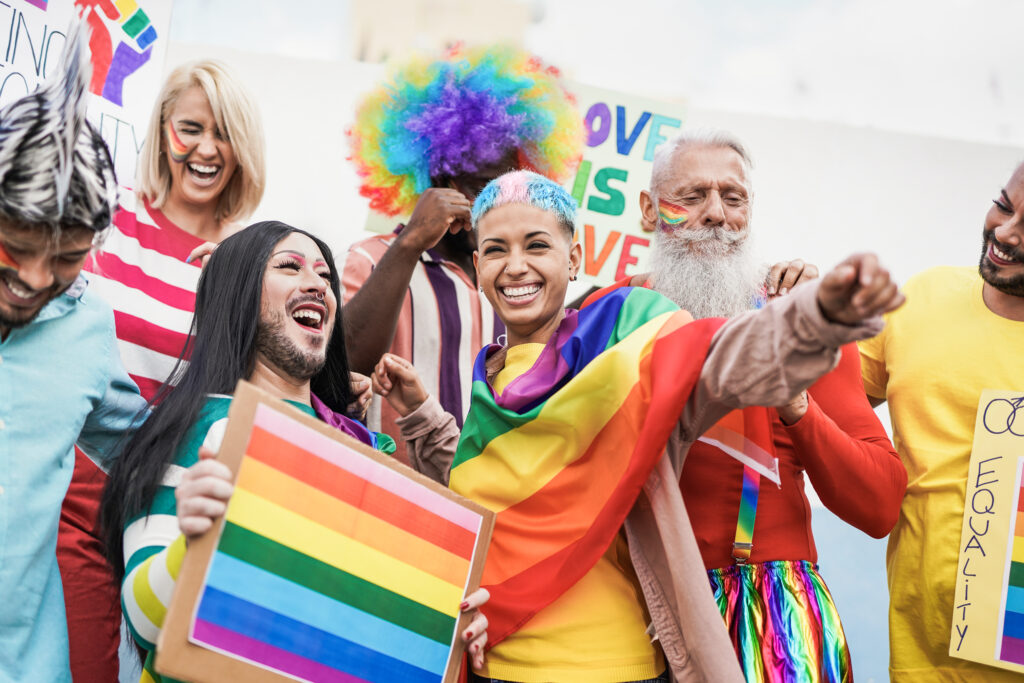
Beyond the Rainbow: Recognizing Mental Health During Pride Month
Pride Month is about celebrating the community’s achievements in the face of continuing challenges, and about asserting the LGBTQ+ community’s basic human rights, right to respect, and equal representation. To us here at Amend Treatment, it’s also about highlighting the importance of mutual support in mental health, and the importance of equitable mental healthcare.
We at Amend Treatment seek to recognize mental health during pride month by highlighting the voices of the LGBTQ+ community, the achievements, and challenges that the LGBTQ+ community face, the importance of sharing your stories, creating and fostering support, and sharing crucial mental health resources.
We understand that many LGBTQ+ people are incredibly resilient, and oftentimes thrive in the face of adversity – but we also see and recognize the risks that many LGBTQ+ people face, especially in these seemingly increasingly hostile times.
The general uptick in anxiety and depressive disorder rates in society is reflected nowhere as strongly as in the LGBTQ+ community.
Statistics tell us that LGBTQ+ individuals are over 2.5 times more likely to utilize mental health services than cisgender heterosexual individuals, often because of the harassment and fear that many LGBTQ+ people, unfortunately, experience; despite greater awareness of the existence of different sexual orientations and gender identities, hate crimes and harassment against LGBTQ+ individuals, as well as attacks on LGBTQ+ spaces and communities have become more prevalent in recent years.
LGBTQ+ People and Mental Health
We want to highlight the ways LGBTQ+ people continue to fight for pride and their right to an equal existence despite the challenges posed by continued stigma and help those who might have had the chance to seek help find their best path toward treatment for common mental health issues, such as depression, anxiety, substance use disorder, and co-occurring disorders.
Individual members of the LGBTQ+ community may face a lot of discrimination from multiple angles, such as due to race, disability, class, sexual orientation, and gender identity all at once. And while certain identities have become somewhat more positively represented in society and media, certain others are still poorly understood or met with more vitriol than others – even from doctors, teachers, lawmakers, and other role models of society.
The stigma that LGBTQ+ people have faced and continue to fight can be a significant risk factor for self-esteem issues, and symptoms of anxiety or depression. Furthermore, people in the LGBTQ+ community, especially transgender individuals and nonbinary (or gender non-conforming) people, have a harder time gaining access to the same mental and physical healthcare afforded to heterosexual, cisgender patients.
Medical providers might assume that certain conditions are falsely linked to a patient’s gender identity. Others face forms of inadequate care, unacceptable harassment, and harmful language, even in clinical settings.
In some cases, gender non-conforming individuals are often worried about seeking medical care for both physical or mental health issues because they often face safety concerns, a lack of culturally competent medical knowledge, as well as a lack of respect from medical staff.
This can discourage people from seeking mental and physical healthcare, or distrust healthcare providers. It’s important to us to highlight and promote LGBTQ+-friendly resources for mental and physical healthcare, such as the LGBTQ+ Healthcare Directory.
Making a Difference Together
For many people, Pride Month provides an opportunity to spend time in public fully representing yourself as you truly are, organizing rallies, parades, or parties as a local community, and encouraging others who have been made to feel shame over their differences to understand that it’s okay to be who you are, and that there are many, many more people who feel the same way, and have managed to express those feelings openly.
At Amend Treatment, we also encourage clients to keep in touch in and outside of treatment, to continue to help each other or become friends through their joined experiences and shared backgrounds, especially among people who feel alone in a world that feels increasingly hostile towards them.
Among friends, families, or communities, Pride Month may also present a chance to discuss and address ways to combat or overcome feelings of stigma against LGBTQ+ people, including public stigma (the thoughts, words, and opinions of the general public or community), institutionalized stigma (discrimination, lack of equal opportunities, or barriers to treatment for physical and mental health conditions), and internalized stigma (recurring negative thoughts and feelings about one’s identity).
Understanding prevalence and the urgency with which better access to treatment and mental healthcare is needed can also bolster a community’s response towards mental health issues among their own LGBTQ+ members, and hopefully help families learn more about a loved one’s personal struggles, the facts on sexual identity and gender, and the role individual family members can play in treatment and mental wellness.
Loud and Proud – Promoting and Celebrating Your Identity
Among many other things, Pride Month is about feeling proud – especially for groups that have been historically marginalized and, even when accepted into the mainstream, continue to be pushed to the sidelines or treated as a merchandising opportunity.
Learning to overcome internalized stigma, build a healthier self-esteem, improve your relationships with others, and become a part of a healthier and supportive community are all important parts in the long-term process towards better mental wellbeing. Self-care is important, as is frequent introspection.
But so is seeking help and professional care, whenever appropriate. If you or a loved one have been struggling with signs of a mental health issue, then talking to a mental health professional or getting in touch with a clinic is crucial, especially in cases of co-occurring disorders or suicidality.
If you or a loved one are looking for mental health help, don’t be afraid to start making calls and asking questions. You don’t have to commit to a treatment or provider immediately. Give us a call to talk about your situation, and whether our residential program might be a fit for your circumstances.
